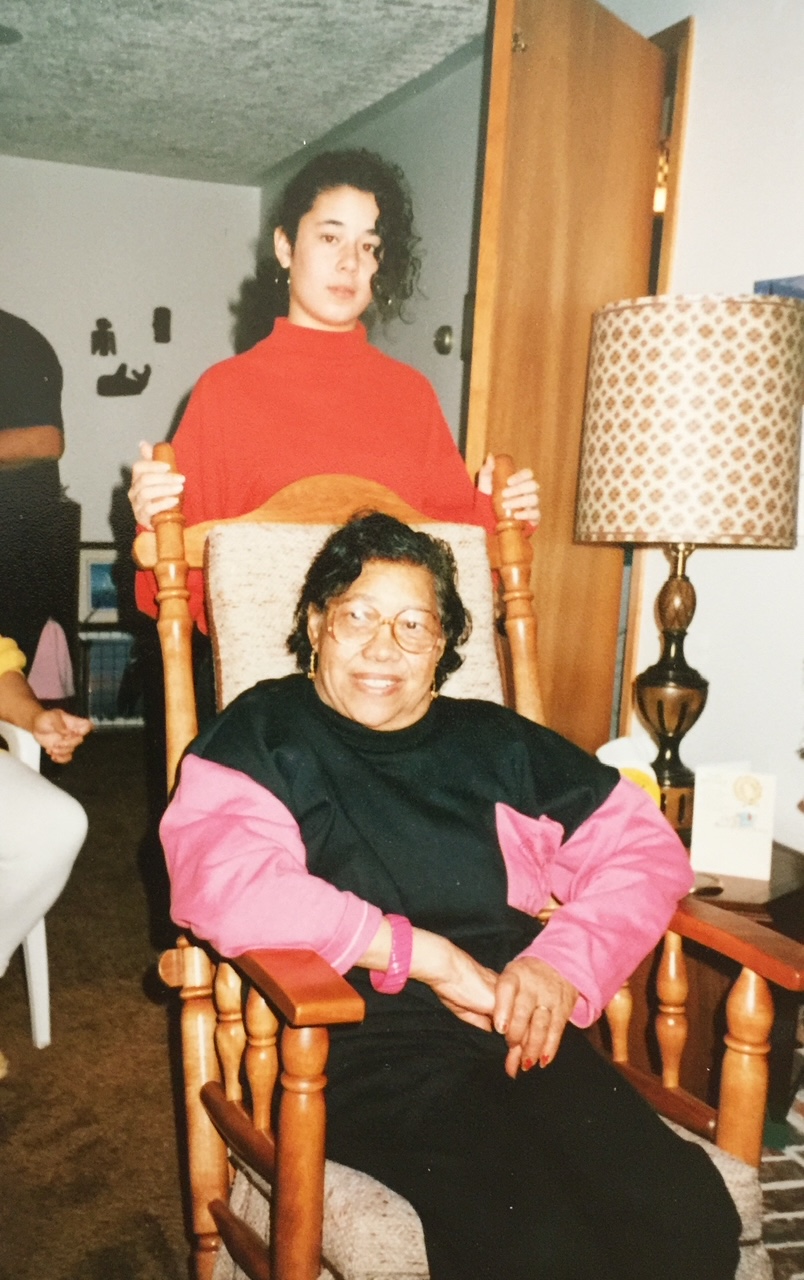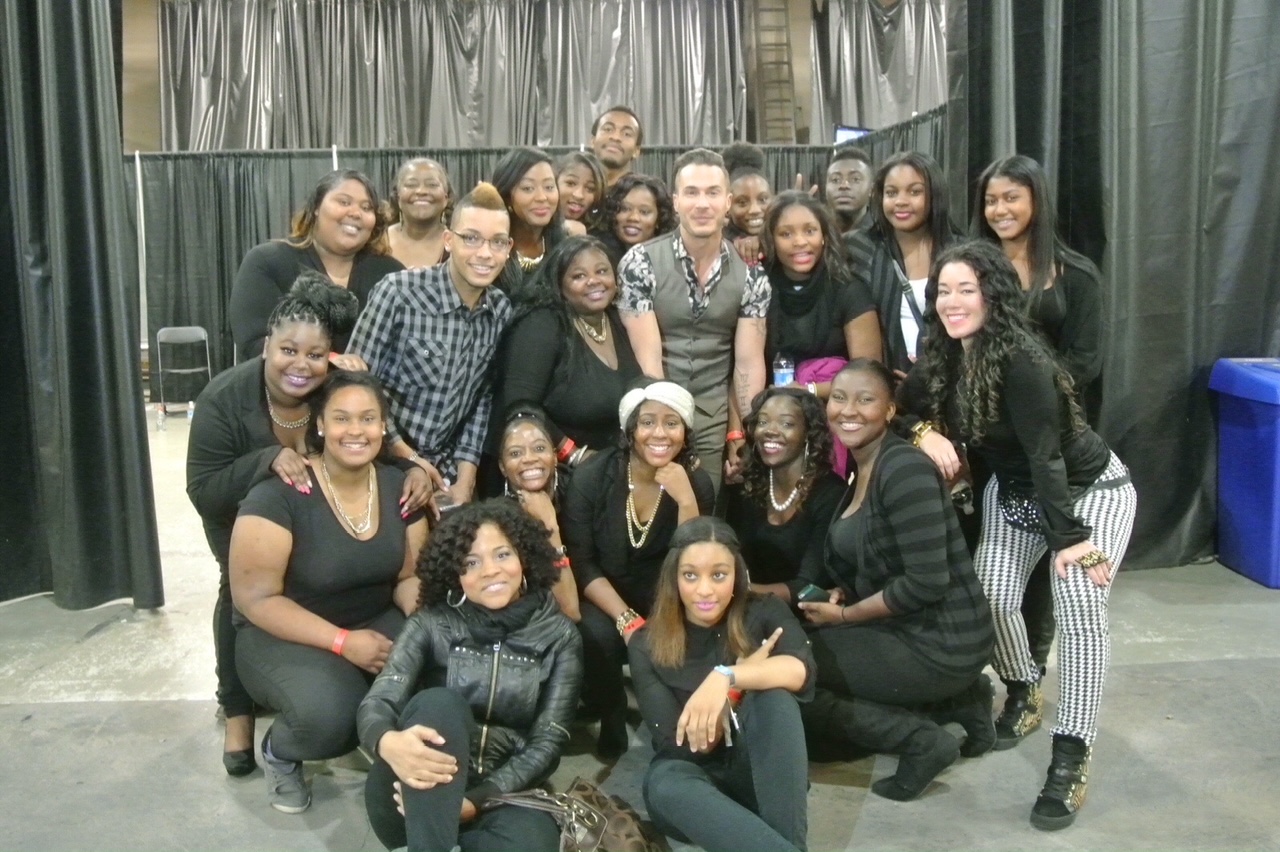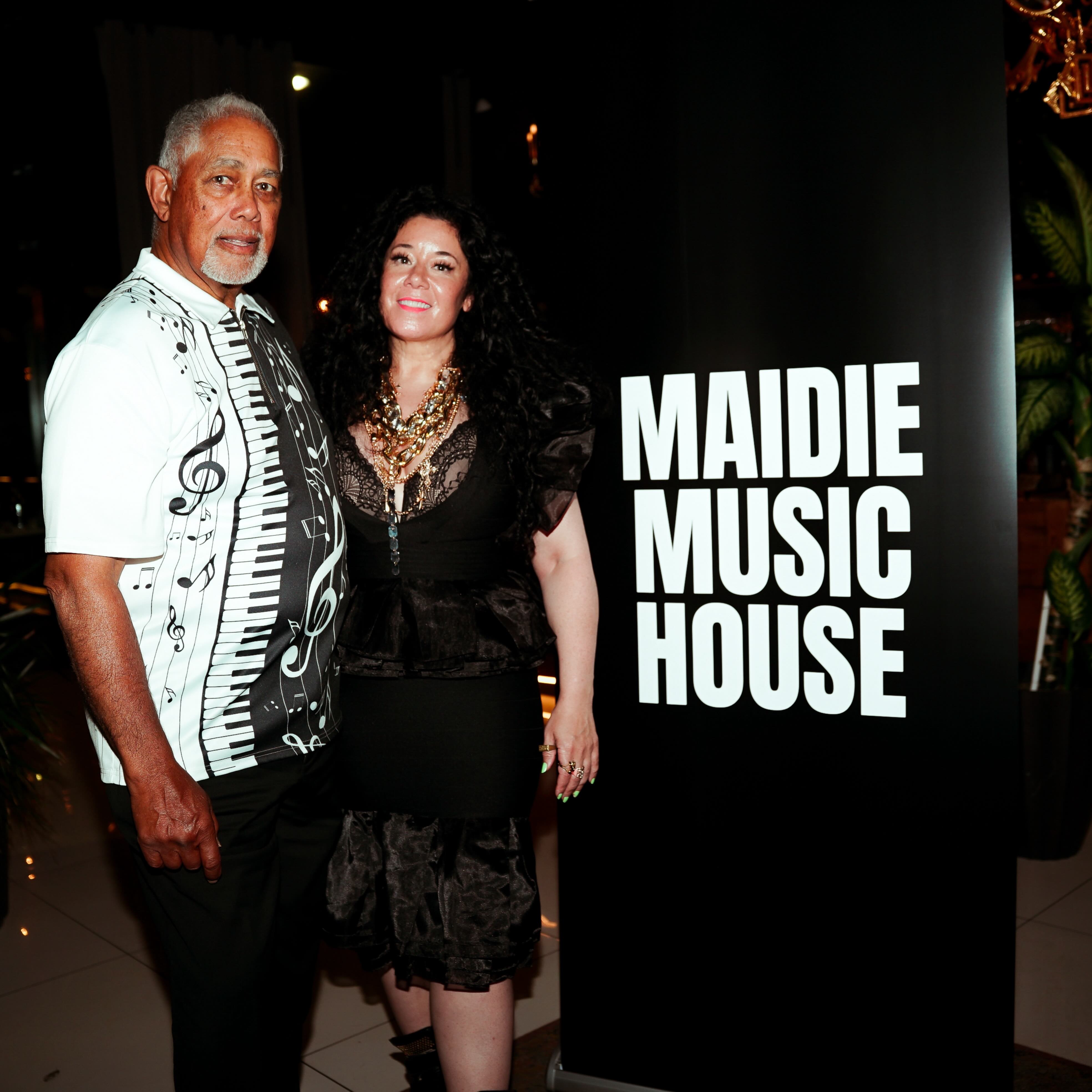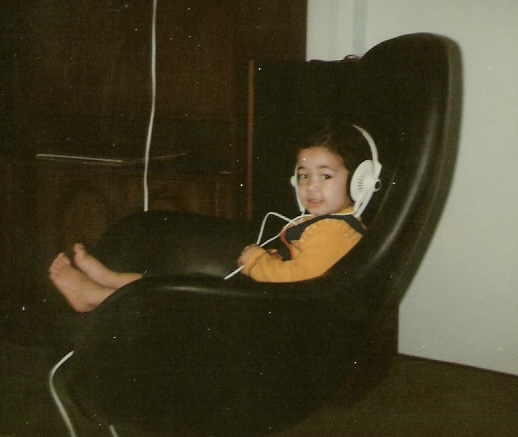
Katrina Lopes

photo credit: Of the Saint
The landing page of KL Management’s web site has this quote from The Think Big Manifesto author Michael Port: “Believe in your dreams. It makes you and everyone around you better.”
Clearly, that line stood out for artist manager Katrina Lopes, but, in her case, it could be tweaked ever so slightly: “Believe in our dreams. It makes you and everyone around you better.” If you help others, encourage them, believe in them, it can radiate and lead to success and that is what Lopes does, especially with her new development company for Black Nova Scotian artists, Maidie Music House, named after her grandmother, Maidie Upshaw, who passed away in 1998.

Katrina Lopes with her late grandmother, Maidie Upshaw, after whom she named her new company Maidie Music House — photo provided.
Lopes, a veteran of the Canadian music industry, who managed platinum-selling pop/R&B artist Shawn Desman’s career for 13 years, and started KL Management Black Mentorship Program in 2017, currently sits on the board of Toronto’s Manifesto and Music Nova Scotia,and served on Music Managers Forum’s board for five years. In 2023, the African Nova Scotian Music Association (ANSMA) gave her the Industry Development Award, and the following year Women In Music Canada presented her with the Career Achievement Award.
She currently manages R&B/soul sisters Reeny and Haliey Smith, solo artists she met when they were part of the North Preston Baptist Youth Fellowship Choir, which backed up Desman at a 2014 We Day performance at Scotiabank Centre. She also mentors music industry professional Shevy Price and Crescendo Fest founder Micah Smith.
Lopes’ love of music came from her family. They had an “unofficial policy” for generations that everyone had to learn to play an instrument. She played flute and the piano, then got into dance. She had never thought of the music business as a career. “It never really occurred to me in Nova Scotia because there's not really an industry or infrastructure there in music,” she says.
Focused on a career in social justice, she went to St. Mary's University in Halifax for international development because they did not have a race relations course or program, then traveled to Haiti, Cuba, Bolivia and Peru to work for various community development projects.
“I ultimately decided I didn't want it as a career choice because I felt I can be passionate about social justice and I don't have to have it as a career. It's just a part of my life,” says Lopes. “I just wanted to do something fun.”
The “fun” came from her cousin, Kerry Crawford, a.k.a. KLC, from award-winning DJ collective Baby Blue Sound Crew.
“I used to come up in the summers for Caribana and stay at the house and hand out flyers for the parties, and when they got their deal, I did their release party in Halifax, so he encouraged me to be a manager, mainly because I was organized and passionate about music.”
It was after she attended National Association of Black Female Executives in Music & Entertainment (NABFEME] in Toronto that she decided to bite the bullet and move to Toronto to give the music business a shot.
“That was from the encouragement from my dad too because it's just my dad and I, and I made the assumption that he wouldn't be supportive of me moving, but it was the opposite,” she recalls. “He said, ‘You can keep hitting your head against a brick wall and all you're going to get is a bloody face. I don't know why you don't move.’
“And then he told me about how in his career he needed to move, even sometimes if it was making lateral positions to grow his career. He worked in government, so I moved almost immediately after he said that.”
Lopes’ first job was as an assistant to a then-booking agent David Bluestein at Courage Artists & Touring. “I wanted to meet a lot of people in a short amount of time because I didn't know anyone in the industry,” she says. “It was great for that because there were so many people coming through the door, but I do not like sales and calling people all day, every day, trying to book shows. I was like, ‘I don't wanna do this.’
“I always had management in the back of my mind because my cousin had told me, ‘You could be a good manager.’ But I knew I didn't know enough to be a manager yet. And so after that, I got involved in Rush The Vote, which [then BMG Music Canada president] Lisa Zbitnew was a big part of. Everything happened a lot more quickly after that because she took me under her wing. After Rush The Vote ended, she still kept me on to help with things. I think she just found things for me to help her with.”
BMG had a subsidiary label, UOMO, looking for a person to be part of their management team and Zbitnew suggested Lopes. The roster included Desman, Keshia Chanté, and production duo Perry Alexander. “And then, this is one date I know, in 2010 was when I left there and started my own company and Shawn came with me,” says Lopes.
The two had a good run. Lopes and Desman parted ways in 2023 because “we were just going in different directions,” she says, but KL Management is still going strong and now she has Maida Music House too.
The opening of the Maidie Music House Manifesto, part of her digital press kit, are these strong words:
“I refuse to watch another generation of talented Black artists get played by an industry that profits from our culture while treating us like we’re disposable. Let me be clear about something, I’ve been in these rooms for over 15 years,” she writes, before outlining some of the things she experienced or witnessed along the way that ranged from contributions being undermined or ignored to ideas being stolen.
“As my career was taking shape, I was seeing a pattern that disrespects our contributions. Brilliant Black women were being locked out of decision-making rooms and when they did break through, their contributions were consistently undermined. It was systemic, calculated and pervasive from boardrooms to industry events.”
After she crossed that marker from newcomer to expert to veteran, it brought perspective. While Maidie Music House was borne out of frustration, anger and necessity, she turned a negative into a positive.
Karen Bliss talked to Lopes about the creation of Maidie Music House, why it’s important and her goal to take it global.
Firstly, tell me about your grandmother and why you decided to pay this wonderful homage to her by naming your company Maidie Music House?
I named the company after my grandmother mainly because, for one, she was the matriarch of our family, but, also, she made music nonnegotiable in our family, which is something that has stuck with me to this day. There was an unwritten rule that everyone had to learn at least one instrument. And I think that was important to her because she knew something that the music industry today doesn't really acknowledge, which is that music shouldn't be a luxury and it's more of a birthright. In the Black community, we come from a long lineage of music, and we use music as a tool for self-expression. It's a tool for resistance; it's something we share when we're celebrating; it reflects our lived experiences. So, for me, I named the company Maidie Music House out of personal importance to me, but I think it's something that most folks in the community can identify with when it comes to the connection between music and family and our lineage.
How is Maidie Music House different from KL Management?
Maidie Music House is a full-service artist development company that’s rooted in Nova Scotian Black heritage and dedicated to its culture. I just wanted to have a particular container. We're already doing the work, but I was doing it disjointedly. Also, it's not only me; it's not my thing. It’s something that other managers who come through this can also own. I want it to be something that is self-sustaining and generates revenue. What I want to do is similar to Motown, creating that type of environment for artists where we're creating the sound of Nova Scotia. When people hear, “Oh, that artist came through Maidie Music House,” then they're familiar with the history of Nova Scotia and the African Nova Scotian community. It makes sense that this talent would come from here, that we have this respect that we, for some reason, don't seem to be able to garner in our own province.
When you started your career, you’re in it and building your career, trying to get your artists opportunities. When did you start noticing that Black voices weren’t getting respected?
Well, to your point, I was in it and I was in it, and experiencing it, and it wasn't until I came to a place in my own career where I was not a junior in my career, where I'm now more experienced and now I have something to offer. I can offer mentorship and I have had the experience myself. I can think of one moment when I got to a place in my career where I was like, “I really want to help build infrastructure in Nova Scotia or help emerging artists.” That was around eight years ago. I created my own mentorship program and started doing workshops and I branded it so that no one would take it as their own.
So this was before the Black Lives Matter influenced the music industry to take a serious look at systemic racism and step up opportunities. What was the moment?
Well, Shawn used to do all the We Day [arena concerts for We Charity] and, in Halifax, he wanted a choir. He didn't have a song in market, so he wanted to perform ‘Lean on Me’ with the North Preston Baptist Youth Fellowship Choir and I got a lot of pushback from the We Day people because they didn't have an EPK. I'm like, “Well, they're a youth choir; they don't have an EPK. It's Nova Scotia; it's not Toronto.” They were recommending that I use the Glee Club from a private school. A glee club is a very different energy than a Black church choir. What is interesting is if Shawn was performing another song and we had dancers, no one's ever asked me for their press kits. Anyway, we used the youth choir; it was amazing — and, as a synchronistic aside, some of those singers who were in that choir I now manage [the Smith sisters] so it’s full circle. Anyway, it’s obvious that they wouldn't have an EPK, but also there are artists whose talent was on par with their peers in the rest of the country, but their branding wasn't. That was when I started seeing myself as someone who could mentor and help fill that gap.
 We Day Halifax, 2014, Katrina Lopes (bottom right) backstage at Scotiabank Centre with Shawn Desman (centre) and the North Preston Baptist Youth Fellowship Choir — photo provided.
We Day Halifax, 2014, Katrina Lopes (bottom right) backstage at Scotiabank Centre with Shawn Desman (centre) and the North Preston Baptist Youth Fellowship Choir — photo provided.
You called it the KL Management Black Mentorship Program. How did you do outreach?
I was specifically mentoring artists. I didn't really know who was gaining traction. I was figuring that out, and then I narrowed it down to artists who were really trying to do this, who were committed, who were showing up. Then I partnered, in different instances, with music industry associations when they were doing their showcases and bringing in delegates.
For example, ECMAs [the East Coast Music Association] had a year where no Black artists submitted to showcase. And they're like, “We need to have Black artists.” Well, there's probably a reason why no one is applying to showcase, but they didn't want to look bad and not have any Black performers and so they cobbled together a committee and they asked me to be on it to identify some Black artists that can perform. And I was like, “Well, I'm not going to identify artists that can perform if there's not going to be delegates there that make sense for them to perform for.” I mean, folk has changed, but, just for the argument's sake, if it's all folk festival buyers and they're not looking for soul, R&B and hip hop acts, then why would these artists be performing for them? So, I negotiated for them to give me a certain number of delegate seats and then invited delegates that made sense for these artists. But I also said I wouldn’t only do that, that I'll do performance coaching, so I named it KL Management Black Mentorship Program because I didn’t want the idea to be taken as theirs. I did that for a couple of years. That program grew because after doing it once, I could do it more officially and have funding.
Why didn't you want to do it in Toronto or be national?
That's what I want to do with Maidie Music House. I want it to be the platform that is taking them out of Nova Scotia. The model that has been used in the East Coast. For example, Nova Scotia Music Week or the ECMAs, in theory, delegates come in, they see these great performances and they do business with them. Even if you have the right delegates and the right artists, there's something that can happen there, but I don't know that that's the most efficient way to launch an artist’s career. I would argue that it's not.
You say in your press kit that organizations were taking your work, your ideas.
Yes, not valuing what I was bringing to the table in that it is strategic architecture to be able to identify the artist that's ready and then identify delegates, not only who are working in this genre but are willing and understand our agenda. They know what we're doing; they understand the vision, and they're actually willing to put somebody on, for example A3C [hip-hop festival and conference in Atlanta, GA]. There has to be some kind of trust there where they're like, “Yeah, I'll come. I know what you're doing.”
But those things don't just happen. Some random person, who doesn't know any of these people, who doesn't know the delegates or the artists or know where they're going, can't just put that together. There was a lack of understanding because the other thing I'll also do is when I invite delegates to, say, the ECMAs or Nova Scotia Music Week, we have a schedule. I have two separate WhatsApp groups, for artists and for delegates. I don't just tell the delegates to check out anyone. I only tell them to see the people that I've been working with or that I co-sign. That takes trust, building that network. So, I do it and it's a success and then they'll organize it, but “We don't need Kat no more. We'll just do it”. And it's like, “Okay, try it. See if you can, first of all, identify the artist and see if those people will still come, and see if you'll be able to figure out all those intricacies.”
Every delegate I brought worked with at least one of the artists in my mentorship program. We did A3C. We did Manifesto. We've done a show in Connecticut. The audience reaction is always the same, “Oh my gosh, this talent, this artist. is unbelievable.” And so, it just seems crazy to me that these music industry associations are still seeing them as local, like they’re doing the artist a favour to have them play, when really, at this point, I think the talent is doing them a favour.
That was not the reason I started Maidie Music House, but in terms of the timing, I was like, “I'm going to do this now because I'm done with this,” and the artists I'm working with now are also ready to be launched elsewhere.
Were you involved in the creation of ADVANCE [Canada’s Black Music Business Collective] or Breaking Down Racial Barriers [which initially did research and data collection and then adding programming and equity consultation]?
I wasn't involved in the creation of either of those things, but I'm friends and colleagues with the people who've created all those things. I was obviously aware and supportive of them. Also, when I was doing my mentorship programs with the music industry associations — ECMAs and Music Nova Scotia — that was around the time both of those organizations would have just been established. So, they came to Nova Scotia. We were all there at the same time, around the end of the pandemic . We've been supportive of each other's initiatives, and it was important to have both ADVANCE and BDRB in Nova Scotia, in Halifax, and come to the community and experience it firsthand. That's been helpful.
I don’t know if amusing is the right word, but how did you feel that doors were opening for you for these ideas and the work because of BLM?
Amusing isn’t the word I would use either, but I know what you’re getting at. It was like everyone is now onboard because they don’t want to get caught out there. But how long will it last — and I can now officially tell you that it has closed.
We can probably blame the President of the United States for that, shutting down DEI and spreading a negative narrative about it. You are currently facilitating the Breaking Down Racial Barriers new program, F.A.M.E.
F.A.M.E. is spearheaded by BDRB specifically for Black music managers, not for artists.
I'm in alignment with what they're doing. So, when that opportunity came about, I was like, “This is exactly what Maidie Music House is about. It's about pouring into the Black artists and the creatives, but also the Black music professionals that support them.” I’m co-creating the curriculum. We have 12 participants and now we're halfway through the 8-week program.
What would be your wish from the industry, based on everything you've learned and observed and the impetus for starting Maidie Music House? In a dream.
In a dream, I think part of me has already let some things go because we have the support of the [Black] community on the East coast, like in Nova Scotia, and I don't think we need anything else in that region now. I believe that we do have the support of the rest of Canada. We have supporters in the U.S. I want this to be global at some point. I'm not saying there's no struggles, but my dad was so right; when I go back to Nova Scotia and I'm trying to advocate I am hitting my head against a brick wall. And then, when I come outside and I have these same artists, people are like, “She's amazing. She's a monster. Reeny is Canada's best kept secret.” Exactly.
“So even when I launched Maidie Music House, I specifically wanted to launch during Crescendo Fest [for African Nova Scotian/Black artists] and on Emancipation Day. So that was a fixed date, August 1. My publicist asked what are your goals? Who do you want? I was really just focused on the event, and I assumed we would get local press and if we get some national stuff, that is great.
It’s important to note that we locked key national outlets within 24 hours, but three weeks pass and still no local press. Fast forward to a few days before the launch. I'm in Nova Scotia and Katie Kelly from CTV News is always huge supporter of everything I do, but I noticed this is really strange a few of the other major local press outlets haven’t picked this up. Maidie Music House is a Nova Scotia based company. I thought it was bizarre. I'm not going to name any names, but some hosts are from my community, and I knew they’d be interested in this story. I can only assume that the producer didn't think it was interesting. So, I made some calls within my community, and within 30 minutes. I got a call from the producer. “Oh, we'd love to cover this.” I know my publicist sent it to them. But this is what I mean. They didn't really think it was that important or valuable enough to report on until someone from the community poked them, but outside of the East Coast, outside of Nova Scotia, people see it the way I think it should be seen, which is as an important and valuable contribution to the music scene.
So how was the turn out?
My dad came and the Upshaws were in the building. One of the things that was really meaningful to me was that there were literally three to four generations of people in the room. There were a handful of teenagers, whose parents had come, and then their parents and then grandparents. I really do feel the matriarchs in our community are the ones who have been holding it down so to see so many of them in the room was really powerful to me. We stand on the shoulders, from generation to generation, of the people that fought for us to have piano lessons or to show up for church choir and all of those things. That was heartwarming for me.









